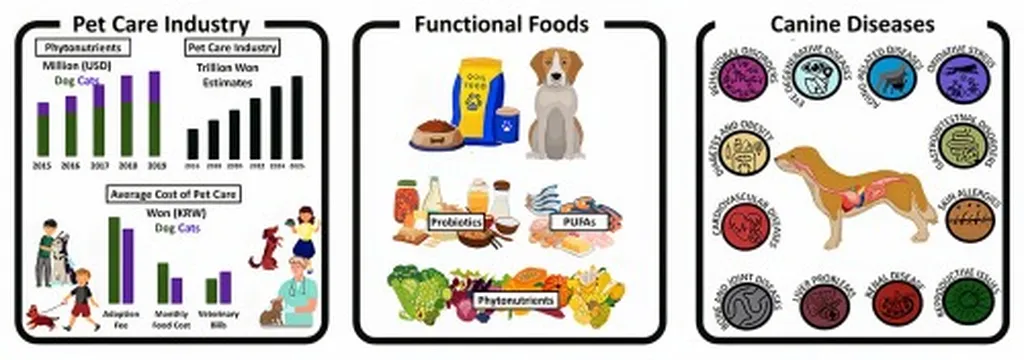In the world of canine nutrition and care, understanding how age influences a dog’s physiology is crucial for pet owners, veterinarians, and the pet food industry. A recent study published in the *Journal of Animal Science and Technology* (translated from Korean as *Journal of Animal Science and Technology*) sheds light on these very aspects, offering insights that could reshape how we approach dog care across different life stages.
Led by Yonggu Kang from the Department of Animal Science and Biotechnology at Chungnam National University in Korea, the study evaluated the effects of age on growth, fecal parameters, nutrient digestibility, hematology, and serum biochemistry in Beagle dogs. The research involved 18 healthy Beagles divided into three age groups: puppies (under 1 year old), adults (1–7 years old), and seniors (over 7 years old). The study lasted for 17 days, with a 7-day adaptation period followed by a 10-day evaluation period.
One of the key findings was that puppies experienced significantly more body weight change compared to adult and senior dogs. “Puppy group had increased body weight change during the study compared with adult and senior groups,” noted Kang. This highlights the rapid growth phase that puppies undergo, which necessitates a diet that supports their developmental needs.
Fecal parameters also varied significantly among the age groups. Puppies had higher fecal moisture content and a higher frequency of diarrhea, indicating that their digestive systems are still developing and may be more sensitive to dietary components. “Puppies had higher fecal moisture content and diarrhea frequency than adult and senior dogs,” Kang explained. This could influence the formulation of puppy-specific diets that are easier to digest and less likely to cause gastrointestinal upset.
Nutrient digestibility was another critical area of focus. The study found that senior dogs had lower apparent total tract digestibility (ATTD) of crude protein compared to puppies and adults. Conversely, puppies had lower ATTD of ether extract, crude fiber, and nitrogen-free extract than adults and seniors. These findings suggest that the digestive efficiency of dogs changes with age, and diets should be tailored to optimize nutrient absorption at each life stage.
Hematological and biochemical parameters also showed age-related differences. Puppies had higher white blood cell and neutrophil counts, indicating a more robust immune response. Senior dogs, on the other hand, had lower levels of serum albumin, glucose, and creatinine, which could reflect age-related changes in metabolism and organ function. “Senior dogs had lower levels of serum albumin, glucose, and creatinine during the evaluation than puppies,” Kang observed. This underscores the importance of regular health monitoring and tailored nutrition for senior dogs to maintain their overall well-being.
The implications of this research are far-reaching. For pet owners, understanding these age-related changes can help in making informed decisions about their dog’s diet and healthcare. For veterinarians, the findings provide a scientific basis for recommending age-appropriate diets and monitoring health parameters more effectively. For the pet food industry, this study highlights the need for specialized diets that cater to the unique nutritional requirements of dogs at different life stages.
As Kang’s research demonstrates, the field of canine nutrition is evolving, driven by a deeper understanding of how age impacts various physiological aspects. This knowledge is not only crucial for improving the quality of life for our canine companions but also presents commercial opportunities for the pet food industry to innovate and develop products that meet these specific needs.
In the broader context, this research could influence the development of precision nutrition for dogs, where diets are tailored to individual age groups to optimize health and well-being. It also emphasizes the importance of regular health check-ups and monitoring, particularly for senior dogs, to detect and address any age-related health issues promptly.
As the pet care industry continues to grow, driven by increasing awareness and investment in animal welfare, studies like this one will play a pivotal role in shaping the future of canine nutrition and healthcare. By leveraging scientific insights, we can ensure that our furry friends receive the best possible care throughout their lives.

